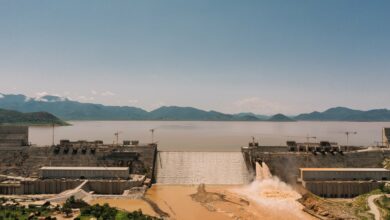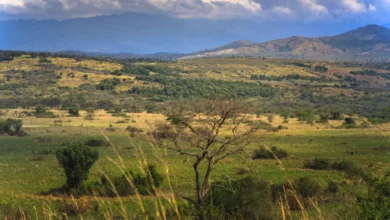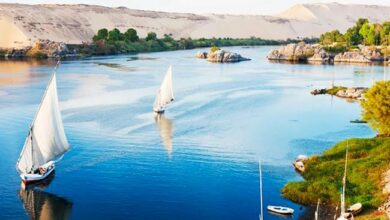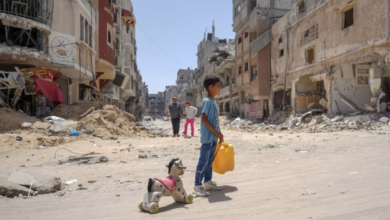
“Water, water everywhere, nor any drop to drink.” Water shortages are in the news as an international conference addressing the global water crisis meets this week.
Up to 20,000 delegates from 180 countries are expected to attend the sixth World Water Forum in Marseille, France this week, which will be held from 12 to 17 March. It is the first time the forum has met in three years. The list of participants includes French President Nicolas Sarkozy, UN Secretary General Ban Ki-moon, European Commission President Jose Manuel Barroso, King Mohammed VI of Morocco and the CEOs of major multinational companies.
But just down the road, critics of the World Water Forum are hosting the Alternative World Water Forum, promoting community-led water management. The organizers — who describe themselves as a global mix of associations, movements, trade unions, NGOs, citizens and elected representatives — accuse the World Water Forum of being a networking event for governments and big corporations, saying alternative voices are silenced. They fear that in the panic to secure water resources, deals will be brokered that disadvantage those who are already suffering shortages.
Egypt’s delegation has flown to Marseille after attending a heated round of meetings with Nile Basin countries over water allocation. Several Nile Basin countries had pressured Egypt to sign a revised cooperative framework agreement that would annul Egypt’s right to veto the building of dams along the Nile, and allocate it less water. The delegation refused to sign.
Egypt’s water resources minister, Hesham Mohamed Qandil, will meet with representatives of Nile Basin countries on the sidelines of the forum, according to a recent ministerial press release. It says Egypt’s participation reflects its “keenness” to support African efforts toward “good management of water resources.”
Unfortunately, exactly what “good management” means is unlikely to become any clearer or any more legally actionable over the coming week. The working agreement for Nile water rights is over 50 years old.
Egypt refuses to substantially renegotiate the 1959 Nile Water Agreement, which allocates 87 percent of the Nile flow to Egypt and the remainder to Sudan. Meanwhile, six of the nine Nile Basin countries have signed a new Nile water deal: Ethiopia, Kenya, Uganda, Rwanda, Tanzania and Burundi.
But a lot has changed since the World Water Forum last convened.
Backing up against the intransigence of Nile water reform, like silt applying pressure to the dam wall, are three years of economic growth and relative political stability in Eastern Africa.
The number of Nile dams is booming. Uganda has the Bujagali and Karuma hydropower dam projects, Ethiopia has the Tekeze and Geba dams, and Sudan has the Merowe and Kajbar Dam. The Grand Ethiopian Renaissance Dam will be the 10th largest in the world.
It is also the first World Water Forum since the founding of the Egypt-Ethiopia Council of Commerce, which replaced mistrust with a certain amount of economic cooperation. Ethiopia is a key member of the Nile Basin countries. Of the four major tributaries of the Nile, three originate in Ethiopia. It supplies an estimated 85 percent of Egypt’s water.
Also applying pressure is the understated urgency of the United National World Water Development Report released Monday to coincide with the forum.
According to the report, the region’s water shortages have continued to worsen:“While the Arab region has long suffered from water scarcity, several drivers and challenges have increased strains on freshwater resources over recent decades, including population growth, migration, changing consumption patterns, regional conflicts, climate change and governance,” the report says.
The figures are startling, though hardly surprising. The global demand for food is expected to increase by 70 percent by 2050, pushing global agricultural water consumption up 19 percent. Global energy consumption — a major water user — is expected to increase by about 50 percent between now and 2035 due to population growth and increasing economic activity, with non‐OECD countries accounting for 84 percent of this increase. The urban population of the world is forecast to grow to 6.3 billion people in 2050 from 3.4 billion in 2009.
An OECD study on global water challenges published a week ago predicts more than 40 percent of the world’s population will live in areas of severe “water-stress” by 2050. Much of Egypt is likely to be represented by this figure.
The Nile Basin is home to 160 million people in 10 countries, four of which are “water scarce.” Within the next 25 years, the population within the basin is expected to double. Egypt’s demand for water will likely exceed supply by 2017. It’s no wonder the Egyptian government refuses to sign away its water allocation.
The world water development report notes that water shortages are not spread equally, either around the globe or within a country. Money can buy water.
“Because allocation will inevitably go to the highest paying sector or region, this may result in an increasingly significant portion of people not being able to satisfy their basic needs for food, energy, water and sanitation. This would not be mere stagnation, but would likely take the form of a distinctly regressive trend compared to current conditions,” the report said.
The World Water Forum will be a litmus test for upholding human rights in the coming period of resource austerity and continued population growth.
The government ministers gathered at the forum will release a declaration of their commitment to the human rights of drinking water and sanitation. It could go one of two ways; the declaration could explicitly re-affirm these rights (and the legal and financial obligations to uphold these rights), or it could muddle out of them. The Guardian reports that it has seen a draft copy of the declaration that commits signatories to pursue the implementation of “human rights obligations relating to access to safe and clean drinking water and sanitation.”
In other words, it looks a lot like a muddle.




